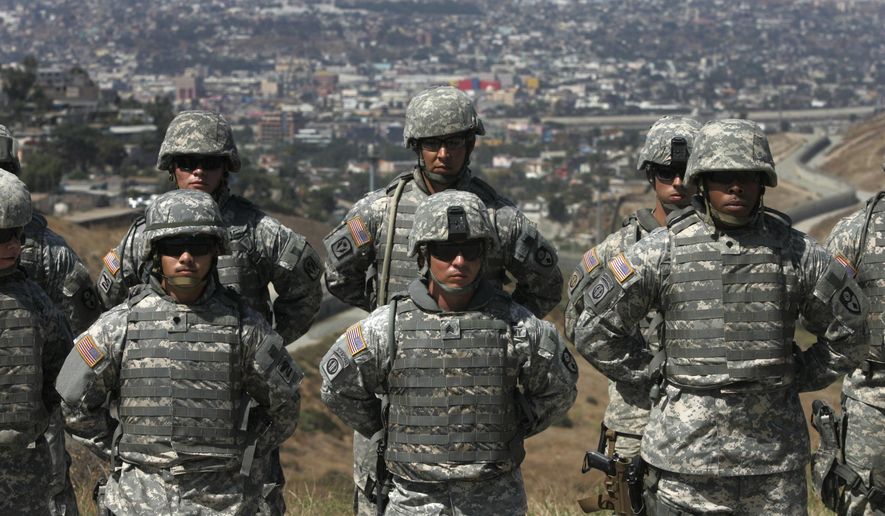The Pentagon announced a massive deployment Monday of military muscle to the U.S.-Mexico border, saying at least 5,200 troops will soon be on the lines helping build fencing, ferry Border Patrol agents to hotspots and provide support as the government braces for the migrant caravan.
The new troops — some of them carrying their weapons — join more than 2,000 National Guard soldiers already sent to the border in the spring, after an earlier caravan exposed holes in American border security and left the Trump administration confounded.
None of the troops will be engaged in actual policing, but they will help the Border Patrol agents and port-of-entry officers stiffen the lines of defense at a time when the government says it’s encountering 1,900 illegal immigrants a day, and is bracing for even more in the form of the caravans.
“The president has made it clear that border security is national security,” said Air Force Gen. Terrence J. O’Shaughnessy, head of U.S. Northern Command. “That is the direction we’re given, that’s the direction that we’re marching to.”
Homeland Security is calling the new military mission Operation Secure Line. The Pentagon is calling it Operation Faithful Patriot.
It fulfills President Trump’s demand, expressed repeatedly this month, that the military take a bigger role in trying to seal off the border to illegal crossings.
It’s not clear, though, how much adding thousands more troops will do to achieve that goal.
The administration itself says the border battle is being lost more in the courts that on the field.
Too few lawyers and judges to process cases have built a massive backlog, leading to hundreds of thousands of migrants being caught, then released, never to show up again for deportation.
Court rulings limiting how long the government can hold migrants for deportation, and lack of bed space to hold them anyway, are also hindrances.
The administration is pondering what it can do, short of a gridlocked Congress reaching some solutions. Options include refusing to allow asylum claims made by people who jump the border, or quickly returning large groups back to Mexico.
“That’s an ongoing conversation on how we best handle that group,” said Customs and Border Protection Commissioner Kevin McAleenan. “If they come as a large group we are talking with Mexico. We’re also considering all potential options in terms of administration authority.”
Mr. Trump’s critics say deploying the military is a pre-election scare tactic.
“The fact is, the caravan of asylum seekers from Honduras is hundreds of miles away from the U.S. border. It’s no threat to the country, it is shrinking in size, unarmed, and filled mostly with women and children,” said Neera Tanden, president of the liberal think tank Center for American Progress.
She said the press was being duped into overwrought coverage by the president’s moves.
Immigrant-rights advocates also said those coming in the caravans should be considered refugees fleeing terrible conditions at home — not illegal immigrants.
“These migrants need water, diapers, and basic necessities — not an army division,” said Shaw Drake, a lawyer who handles border issues at the American Civil Liberties Union.
But the Trump administration says people fleeing Central American already have a chance at safety in Mexico, which is considered a safe country, and which has made offers of asylum and jobs to many of the caravan’s participants. While some have accepted, most have refused, saying their goal is to reach the U.S. to win jobs or reunited with family already here, usually illegally.
“The caravan has already been offered protections in Mexico, you will not be allowed to enter the U.S. the same way,” Mr. McAleenan said.
He said the latest count puts the caravan, which busted into Mexico a week ago and is heading north, at about 3,500 people. Another caravan of perhaps 3,000 sits on Guatemala-Mexico border.
Mr. McAleenan said they’re paying up to $7,000 a person to smugglers to help them make the journey.
One major job of the new troops will be to harden the ports of entry, hoping to funnel the caravan to them — and to prevent people from trying to sneak in around them.
Gen. O’Shaughnessy said his troops already have 22 miles of razor wire ready, and can string up to 150 miles. He also said part of the new deployment will be helicopters with good night sensors to spot groups of people trying to sneak in, and to carry Border Patrol agents who can fast-rope down to stop them.
Mr. McAleenan attempted Monday to put some specifics to Mr. Trump’s claims of evildoers and Middle Easterners among the caravans. The commissioner said his agency nabbed 17,000 criminals among the more than 500,000 illegal immigrants encountered at the U.S.-Mexico border last year, and said the migrants came from more than 100 countries.
Mr. McAleenan did not, however, tie those numbers specifically to the caravans, as Mr. Trump did.
Mr. Trump is also reportedly considering delivering a speech on immigration and the caravan — a move that is angering immigration activists.
Frank Sharry, executive director of America’s Voice, said such a speech would be “flirting with danger and provoking violence for the sake of the Republican Party’s political fortunes.”
White House press secretary Sarah Huckabee Sanders told reporters Monday she was not aware of any such planned speech.
• Stephen Dinan can be reached at sdinan@washingtontimes.com.




Please read our comment policy before commenting.